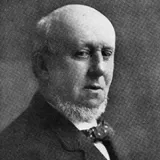
It has been the University of Vermont's good fortune to be blessed with strong presidential leadership during times of crisis. The year 1866 was such a time. As a result of the Civil War, enrollments had declined to only thirty students, leading to a deep drop in tuition revenues. The campus fence was dilapidated, buildings were deteriorating, and the green had run to hay. More than thirteen thousand dollars was due in accounts payable (mainly in back salaries to all five faculty members), and morale was extremely low. Such was the setting that greeted James B. Angell when he was inaugurated as UVM's tenth president on August 1, 1866.
James Burrill Angell was born in Scituate, Rhode Island, on January 7, 1829. He graduated from Brown University with highest honors in 1849. After traveling to Europe, he returned to Brown to teach modern languages for seven years. On November 26, 1855, he married Sarah S. Caswell, the only daughter of the Reverend Alexis Caswell, who later became president of Brown. She was a woman of great personal charm and tact. In 1860 Angell resigned his teaching position to serve as editor of the Providence Journal, a position he held for six years prior to his election as president of the University of Vermont.
The major challenge Angell faced when he assumed the presidency was the need to strengthen enrollments and finances while also quelling the anxiety that greeted the new State Agricultural College established in 1865 under the Morrill Act. Many alumni of the old university feared it would lead to a lowering of academic standards and an abandonment of the classical curriculum. Conversely, many farmers feared the practical studies they wanted would be subverted in favor of classical studies.
Angell recognized the importance of this issue in his inaugural address when he promised to balance the needs of the humanities and the natural sciences by raising $100,000 to increase salaries and hire new faculty. This commitment was critically important in restoring confidence among the older alumni, who contributed twenty-five thousand dollars to endow a new James Marsh professorship in philosophy. The citizens of Burlington subscribed thirty-three thousand dollars within a year of Angell's arrival, and the president solicited good will by traveling throughout Vermont, in his words, to visit all the state and country fairs and compete with the two-headed calves and other curiosities in attracting public attention.
By 1870 enrollments had doubled, and eighty thousand dollars had been raised. Annual professorial salaries were increased from $1,200 to $1,500. New faculty members were appointed, including George H. Perkins, professor of zoology and botany, who was to remain at UVM for sixty-three years.
H. A. P. Torrey was named as the James Marsh Professor. Buildings were renovated, a new science laboratory was equipped, and a president's house was built for the Angells on the present-day site of Ira Allen Chapel. President and Mrs. Angell were very approachable, and they had a strong impact on all who met them. Since the chairs of history, rhetoric, german, and international law were not occupied, President Angell taught these subjects himself. He had a remarkable memory for faces and knew all the students, who affectionately called him Prexy Gabriel.
In 1869 President Angell declined an offer to serve as president of the University of Michigan, but when the same offer was renewed in 1871, he accepted. Although everyone was sad to see him leave, they were grateful for what he had done to restore health and vigor to UVM.
President Angell served as president of the University of Michigan for thirty-eight years until he resigned following his eightieth birthday in 1909. While at Michigan, he took leaves to serve as United States minister to both China and Turkey. He received honorary degrees from Brown, Columbia, Rutgers, Princeton, Harvard, Yale, Dartmouth, Johns Hopkins, Vermont, Wisconsin, Michigan, Miami, and Peking universities. His wife died in 1906, having borne two sons. The elder served as a judge and lawyer, and the younger was elected president of Yale University in 1921. James Angell died in Ann Arbor, Michigan, on April 1, 1916, at the age of eighty-seven. He had served the University of Vermont — and the entire higher education community — with great distinction.